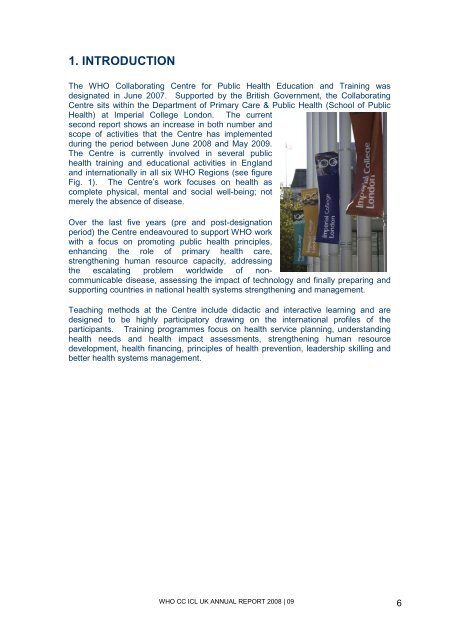2009 Annual Report - Imperial College Faculty of Medicine ...
2009 Annual Report - Imperial College Faculty of Medicine ... 2009 Annual Report - Imperial College Faculty of Medicine ...
1. INTRODUCTIONThe WHO Collaborating Centre for Public Health Education and Training wasdesignated in June 2007. Supported by the British Government, the CollaboratingCentre sits within the Department of Primary Care & Public Health (School of PublicHealth) at Imperial College London. The currentsecond report shows an increase in both number andscope of activities that the Centre has implementedduring the period between June 2008 and May 2009.The Centre is currently involved in several publichealth training and educational activities in Englandand internationally in all six WHO Regions (see figureFig. 1). The Centre’s work focuses on health ascomplete physical, mental and social well-being; notmerely the absence of disease.Over the last five years (pre and post-designationperiod) the Centre endeavoured to support WHO workwith a focus on promoting public health principles,enhancing the role of primary health care,strengthening human resource capacity, addressingthe escalating problem worldwide of noncommunicabledisease, assessing the impact of technology and finally preparing andsupporting countries in national health systems strengthening and management.Teaching methods at the Centre include didactic and interactive learning and aredesigned to be highly participatory drawing on the international profiles of theparticipants. Training programmes focus on health service planning, understandinghealth needs and health impact assessments, strengthening human resourcedevelopment, health financing, principles of health prevention, leadership skilling andbetter health systems management.WHO CC ICL UK ANNUAL REPORT 2008 | 09 6
The Centre also provides an extensive programme of consultancies at an internationallevel supporting countries in health system reform, modernisation, financing andcapacity development. The nature of this vital work is to enable countries to meet thehealth challenges of the 21st Century while securing the health of the whole populationand ensuring fairness in service delivery and use of resources. The Centre’s innovativeapproach has been instrumental inensuring better and sustainable healthfor many countries around the world.The Centre continues to expand andhas been increasingly active instrengthening primary care and publichealth in lower and middle-incomecountries. Through workshops,collaborations, conference papers,academic exchanges and networking,the Centre’s publications have beenvaried and prolific. Research hascontinued in human resource development with a focus on public health education andtraining including support in establishing schools of public health and strengthening ofpublic health elements in medical and health-related educational programmes.Consultancy work has focused on developing anddisseminating good public health and primary healthcare practice including general family practice.In October 2008, the Centre relocated from SouthWest London to Imperial College, Charing CrossCampus. Now in the heart of Central London, theCentre, with its strong links to the Department ofPrimary Care and Public Health as part of the Schoolof Public Health has created a magnificent opportunityfor WHO Fellows to access, explore and benefit fromone of the world’s leading research and medicalfacilities. Imperial College London, with a reputationOur innovativeapproach has beeninstrumental inensuring betterhealth for all in manycountries around theworldfor excellence in teaching and research, attracts students and staff of the highestinternational quality and is repeatedly ranked among the world’s top 10 universities.This development leads the Centre towards playing a stronger role in executing itsobjectives in more countries around the world and prepares the ground for the Centre’sapplication for re-designation in June 2011.WHO CC ICL UK ANNUAL REPORT 2008 | 09 7
- Page 1 and 2: WHO Collaborating CentrePublic Heal
- Page 3 and 4: Professor Salman RawafMD PhD DPH MP
- Page 5: TABLE OF CONTENTS1. INTRODUCTION2.
- Page 9 and 10: WHO Collaborating Centre Activities
- Page 11 and 12: learning opportunities to students
- Page 13 and 14: objectives, methodology and content
- Page 15 and 16: private sector, strengthening the g
- Page 17 and 18: these problems are not yet included
- Page 19 and 20: 4. WHO COLLABORATIONVisits by WHO s
- Page 21 and 22: Committed to supporting countries w
- Page 23 and 24: 13. Pringle M, Baker M, Rawaf S, Vi
- Page 25: supported and undertaken by the Reg
1. INTRODUCTIONThe WHO Collaborating Centre for Public Health Education and Training wasdesignated in June 2007. Supported by the British Government, the CollaboratingCentre sits within the Department <strong>of</strong> Primary Care & Public Health (School <strong>of</strong> PublicHealth) at <strong>Imperial</strong> <strong>College</strong> London. The currentsecond report shows an increase in both number andscope <strong>of</strong> activities that the Centre has implementedduring the period between June 2008 and May <strong>2009</strong>.The Centre is currently involved in several publichealth training and educational activities in Englandand internationally in all six WHO Regions (see figureFig. 1). The Centre’s work focuses on health ascomplete physical, mental and social well-being; notmerely the absence <strong>of</strong> disease.Over the last five years (pre and post-designationperiod) the Centre endeavoured to support WHO workwith a focus on promoting public health principles,enhancing the role <strong>of</strong> primary health care,strengthening human resource capacity, addressingthe escalating problem worldwide <strong>of</strong> noncommunicabledisease, assessing the impact <strong>of</strong> technology and finally preparing andsupporting countries in national health systems strengthening and management.Teaching methods at the Centre include didactic and interactive learning and aredesigned to be highly participatory drawing on the international pr<strong>of</strong>iles <strong>of</strong> theparticipants. Training programmes focus on health service planning, understandinghealth needs and health impact assessments, strengthening human resourcedevelopment, health financing, principles <strong>of</strong> health prevention, leadership skilling andbetter health systems management.WHO CC ICL UK ANNUAL REPORT 2008 | 09 6



